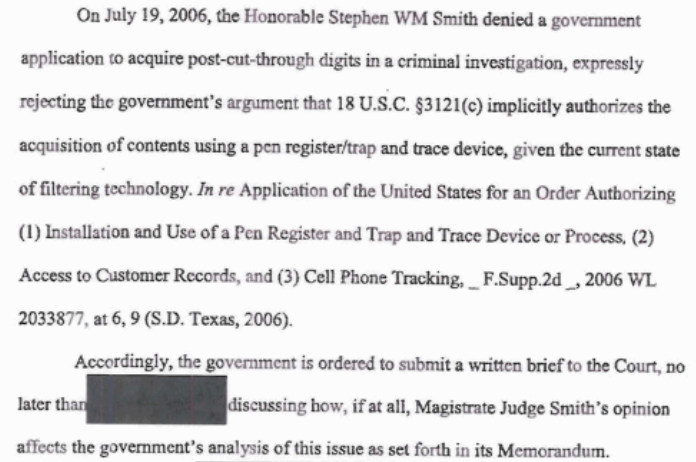How the FISC Takes Notice of Magistrate Decisions and DOJ Tries to Hide That
Since it’s fashionable to debate whether the FISA Court is a rubber stamp or not, I wanted to point to this document, released to EFF under FOIA yesterday. Is is an August 7, 2006 order from Colleen Kollar-Kotelly for additional briefing on whether the government can retain the Post Cut Through Dialed Digits collected as part of a pen register. In this release, the government has redacted the date. We know the date — and the general circumstances of the request — from documents released in 2014 and another earlier EFF FOIA. I covered it here.
During this period, on August 7, 2006, Colleen Kollar-Kotelly ordered briefing in docket PRTT 06-102 on how FBI was fulfilling its obligation, apparently under the 2002 DOJ directive FBI maintained did not apply to FISA, not to affirmatively use PCTDD for any investigative purpose. PDF 39-40
Judge Kotelly has ordered the FBI to submit a report no later than September 25 (2006). This report must contain:
(1) an explanation of how the FBI is implementing its obligation to make no affirmative investigative use, through pen register authorization, of post-cut-through digits that do not constitute call dialing, routing, addressing or signaling information, except in a rare case in order to prevent an immediate danger of death, serious physical injury or harm to the National Security, addressing in particular: a) whether post-cut-through digits obtained via FISA pen register surveillance are uploaded into TA, Proton, IDW, EDMS, TED, or any other FBI system; and b) if so what procedures are in place to ensure that no affirmative investigative use is made of postcut-through digits that do not constitute call dialing, routing, addressing or signaling information, including whether such procedures mandate that this information be deleted from the relevant system.
(2) an explanation of what procedures are in place to ensure that the Court is notified, as required pursuant to the Courts Order in the above captioned matter, whenever the government decides to make affirmative investigative use of post-cut-through digits that do not constitute call dialing, routing, addressing or signaling information in order to prevent an immediate danger of death, serious physical injury, or harm to the national security.
At the time, at least some of FBI’s lawyers believed that for FISA Pen Registers, FBI retained all the PCTDD. PDF 38
When DSC 3000 is used for a FISA collection, doesn’t the DCS 3000 pass all to the [redacted](DSC 5000) including the PCTDD–in other words for FISAs the DCS3000 does NOT use the default of not recoding [sic] the PCTTD???? [sic]
This report — dated September 25, 2006 — appears to be the report Kollar-Kotelly requested. It implores her not to follow [redacted], which
appears tois a referencethe EDNY courtTexas decision.That report is followed by this one — which was submitted on November 1, 2006 — which appears to propose new procedures to convince her to permit the FBI to continue to collect and retain PCTDD.
This new document, the briefing order, adds almost nothing to the discussion.
Except for this: it reveals that FISC — not DOJ — raised Stephen Smith’s opinion.
This is why I defend the FISC against claims it’s a rubber stamp. It has, on at least some occasions, done the work an adversary would normally do. And for at least 3 years, DOJ has tried to hide that FISC had to do so here.
Note what has happened in the interim? The government didn’t release this in FOIA in 2013-2014, though it was responsive to those earlier FOIA requests.
It did, however, release it now.
In the interim, DOJ gamed the new FISCR fast-track process, so as to be able to get an appellate decision approving the broader retention that Kollar-Kotelly first questioned back in 2006. Now, with that FISCR decision in pocket, DOJ has all of a sudden decided this order is no longer too classified to release (even while it still hides the timing of it).
The FISC is not perfect. But when weighing whether the FISC or DOJ (saddled, perhaps, with incomplete disclosure from NSA) has more often resulted in questionable decisions, I would almost always blame DOJ and NSA over the FISC.
